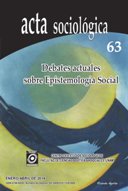Social Epistemology and deliberative democracy
Main Article Content
Abstract
Contemporary societies face tensions related with the unequal distribution of knowledge and simultaneous demands for democratic equality that are central to Social Epistemology´s inquiry. This article describes how the defenders of deliberative democracy explain their characteristics and epistemological virtues; the objections placed by their critics related to public ignorance, and describes issues related to deliberative inequalities and epistemic injustices. It finally proposes that tackling democracy´s epistemic obstacles does not entail that all citizens should have equal influence in deliberations and decisions.
Article Details
How to Cite
Murguía Lores, A. (2014). Social Epistemology and deliberative democracy. Acta Sociológica, (63). https://doi.org/10.1016/S0186-6028(14)70477-3
